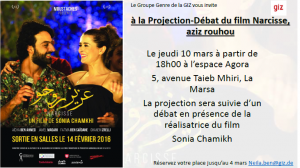Event Documentation:
Around 50 GIZ staff watched the Tunisian movie “Narcisse” followed by a debate with director Sonia Chamkhi and several actors. The movie tells the story of Hind, a 30-year-old actress, who has the lead role in a play directed by her husband Taoufik. The play is inspired by the tragic experiences of Hind and her younger brother, Mehdi, a famous gay singer. Both were oppressed by their older brother, a juvenile man who was seduced by religious fundamentalism. While Mehdi is torn between his secret love and the prospect of marrying, Hind decides to confront the family’s thorny present and reveal the hidden secrets of its past.
The following debate was about the perception of homosexuality in Tunisia and more in general on the role everybody, women and men, has to play in a society full of constraints and based on the complex struggle over personal and collective identities. The question of whether Hind and the other characters have succeeded in their quest for emancipation remained unanswered and contested.
———————————————
When: Thursday 10 March, 6 pm
With: Sonia Chamkhi (producer/director)
What: The Tunisian movie “Narcisse” will be shown followed by a debate with Sonia Chamkhi. The movie tells the story of Hind, a 30-year-old actress, who has the lead role in a play directed by her husband Taoufik. The play is inspired by the tragic experiences of Hind and her younger brother, Mehdi, a famous gay singer. Both were oppressed by their older brother, a juvenile man who was seduced by religious fundamentalism. While Mehdi is torn between his secret love and the prospect of marrying, Hind decides to confront the family’s thorny present and reveal the hidden secrets of its past.
Sonia Chamkhi has produced six movies, four of which are documentaries and two feature films. Her seventh effort combines elements of both genres in borrowing pieces of the director’s biography in portraying an otherwise typical Tunisian family, plagued by the cycle of domestic abuse; the abuse inflicted by the fundamentalist brother replaces that of the family’s father. The film also deals with homosexuality, societal constraints and maternity, underscoring the complexity of these issues within Tunisian society, all against the backdrop of the 2011 Revolution and its aftermath.


